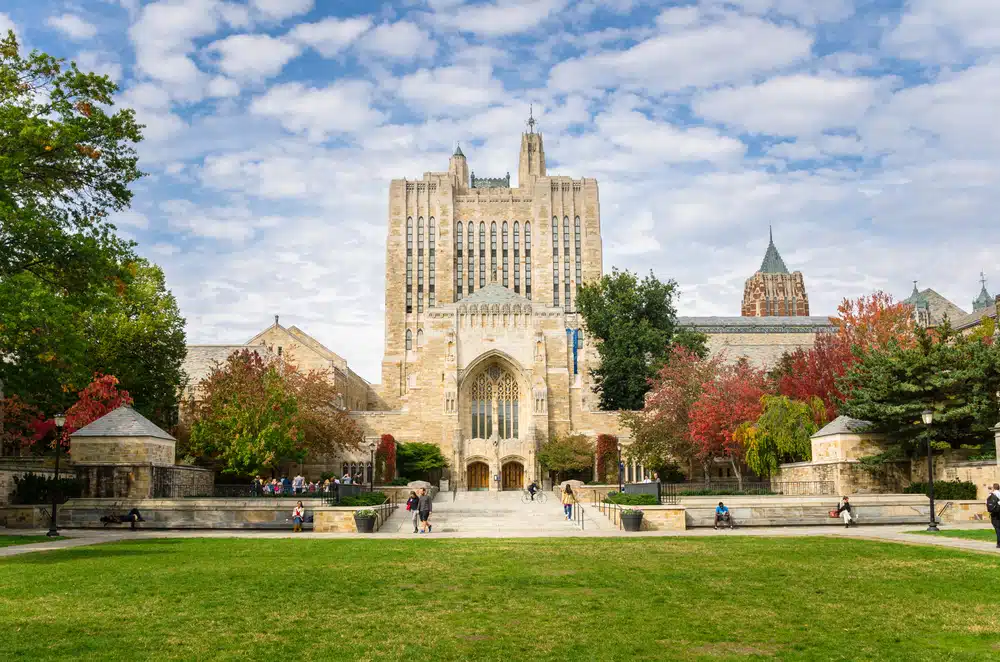Who Is the Founder of Yale University?
Yale University, a prestigious Ivy League institution, is renowned worldwide for its tremendous contribution to higher education and research. With its rich history and prominent alumni, the university undoubtedly holds many stories, but one aspect that often piques interest is the origin of the institution. Questions such as, who founded Yale University? How did it begin and what is its historical significance? Let us delve into an exploratory journey deep exploration into the annals of Yale University’s past. This article reveals who the founder of Yale University is.
The Early Beginnings of Yale University
In the early years, before Yale University was what we know it today, it was founded as a Collegiate School in 1701. This dedicated space for education and learning was realized in large part due to the collective efforts of a group of colonial clergy who ardently desired to educate ministerial leaders in the American colonies.
The establishment of the Collegiate School marked a significant turning point in the history of education in colonial America. At a time when opportunities for higher learning were limited, these visionary clergymen sought to create an institution that would provide a comprehensive education to young men, equipping them with the knowledge and skills necessary to lead their communities.
The Role of the Colonial Clergy
The essence of Yale University’s formation can be traced back to these clergy’s vision. Zealous men like James Pierpont, Samuel Russel, and others, believed in the system of education that could cultivate leadership based on religion, ethics, and intellectual development. They desired to establish a school where young men could be educated in the liberal arts and be prepared for leadership roles in the church, government, and learned professions.
These clergymen were not only passionate about religious education but also recognized the importance of a well-rounded curriculum that encompassed various disciplines. They understood that a broad education would not only foster intellectual growth but also nurture critical thinking, creativity, and a sense of civic responsibility.
Following this determined effort, The Collegiate School was established in Saybrook, Connecticut. This would soon go on to evolve into the Yale University we know today.
The Influence of the British University System
As these clergymen had graduated from prestigious institutions such as Harvard and Cambridge, the educational system they envisioned was heavily influenced by the British University system. This influence is reflected in the curriculum structure, guidelines, and scholastic ethics.
The founders of the Collegiate School sought to emulate the rigorous academic standards and intellectual traditions of their alma maters. They believed that by adopting a similar model, they could provide their students with a world-class education that would rival the finest institutions in Europe.
The curriculum at the Collegiate School was designed to encompass a wide range of subjects, including theology, philosophy, mathematics, natural sciences, and languages. Students were encouraged to engage in lively debates, challenging conventional wisdom and exploring new ideas. This emphasis on intellectual curiosity and critical thinking set the stage for the vibrant intellectual culture that would come to define Yale University.
It cultivated an environment where the pursuit of knowledge was celebrated, with an emphasis on critical thinking, spirited debate, and academic discipline, elements that to this day continue to be the backbone of Yale’s strong academic culture.
Unveiling the Founder: Elihu Yale
This article reveals who the founder of Yale University is. While the foundational groundwork of the Collegiate School was laid by the colonial clergy, the man who would lend his name to this great institution was Elihu Yale.
Elihu Yale’s story begins in Boston, Massachusetts in 1649. Born into a family of Puritan settlers, he was raised with a strong sense of religious devotion and a thirst for knowledge. However, his path would take him far beyond the shores of America.
Elihu Yale’s Early Life and Education
At a young age, Yale’s family moved back to England, where he received his formal education. He attended the prestigious Charterhouse School in London, known for its rigorous academic curriculum and emphasis on character development. It was here that Yale’s intellectual abilities and leadership qualities began to shine.
After completing his education, Yale embarked on a journey that would shape the course of his life. He joined the East India Company, a powerful trading organization that held a monopoly on British trade with the East Indies. This decision would lead him to the bustling city of Madras, India, where he would spend a significant part of his life.
In Madras, Yale immersed himself in the vibrant cultural and commercial scene. He quickly rose through the ranks of the East India Company, becoming a prominent figure in the city’s social and economic circles. His astute business acumen and entrepreneurial spirit allowed him to amass considerable wealth, making him one of the wealthiest men of his time.
Despite his success in India, Yale never forgot his roots. He maintained strong connections with his homeland and remained deeply committed to philanthropy. His experiences in Madras exposed him to the stark realities of poverty and inequality, and he felt a deep sense of responsibility to give back to society.
Yale’s Philanthropy and Legacy
It was in 1718 that Elihu Yale’s philanthropic endeavors would intersect with the Collegiate School. At this point, the decision was made to relocate the school from Saybrook to the growing town of New Haven. The institution was in need of financial support to ensure its successful transition and continued growth.
Recognizing the importance of education and the potential impact of his contribution, Elihu Yale made a generous gift to the Collegiate School. His donation not only provided the necessary funds for the school’s relocation but also laid the foundation for its future success.
In honor of his extraordinary generosity, the Collegiate School was renamed “Yale College”. This momentous event marked the beginning of Elihu Yale’s enduring legacy and established Yale College as a landmark institution in the world of academia.
Yale’s philanthropy did not end with his donation to the Collegiate School. Throughout his life, he continued to support various charitable causes, including the establishment of scholarships and the funding of educational institutions. His unwavering commitment to education and social welfare left an indelible mark on both sides of the Atlantic.
Today, Yale University stands as a testament to the vision and generosity of its founder, Elihu Yale. His dedication to the pursuit of knowledge and his belief in the transformative power of education continue to shape the institution’s values and mission. The legacy of Elihu Yale lives on, inspiring generations of scholars to strive for excellence and make a positive impact on the world.
The Establishment of Yale University
The transformation from Yale College to Yale University was not sudden. It was a slow and steady progression that evolved over the years. We discover who the founder of Yale University is, and that’s Elihu Yale.
Yale College, founded in 1701, initially faced numerous challenges that tested its resilience and determination. One of the major hurdles was the constant financial pressures that the institution had to navigate. With limited resources and a growing student body, Yale College had to find innovative ways to secure funding for its operations and expansion. Generous donations from alumni, philanthropists, and benefactors played a crucial role in ensuring the college’s survival and growth.
Another challenge that Yale College encountered was the politicization of the curriculum. In its early years, the college faced external pressures to align its educational offerings with specific political ideologies. However, the institution remained steadfast in its commitment to providing a well-rounded education that encouraged critical thinking and intellectual exploration. This dedication to academic freedom and independence laid the foundation for Yale’s future as a renowned center for intellectual inquiry.
Uncertainty about its future direction also posed a significant challenge for Yale College. As the educational landscape evolved, the college had to adapt and redefine its mission to stay relevant. It navigated through various educational philosophies and pedagogical approaches, always striving to provide the best possible education for its students.
The Initial Years and Challenges
Even after its establishment, the college faced numerous challenges including financial pressures, politicization of the curriculum, and uncertainty about its future direction. However, with each passing decade, Yale College steadily progressed towards becoming a full-scale university.
Despite these challenges, Yale College persevered and continued to grow. The dedication and hard work of its faculty, staff, and students contributed to its steady evolution. The college’s commitment to academic excellence and its emphasis on fostering critical thinking skills attracted talented individuals who were eager to contribute to the institution’s growth.
As the years went by, Yale College’s reputation as a center for intellectual rigor and innovation grew. It became a hub for scholarly pursuits and a place where groundbreaking research and discoveries were made. This reputation attracted renowned scholars and experts from various fields, further enhancing the college’s academic standing.
Yale University’s Evolution Over Time
Over the centuries, Yale has embraced change while holding firm to its foundational values of critical thinking, ethical leadership, and academic excellence. Today, the university offers numerous undergraduate and postgraduate courses across various disciplines, attracting students from around the world.
Yale University’s evolution into a comprehensive institution of higher learning has been marked by continuous expansion and innovation. The university has established new schools and departments, broadening its academic offerings to cater to the diverse interests and aspirations of its students. From the arts and humanities to the sciences and social sciences, Yale University provides a wide range of educational opportunities that foster intellectual growth and personal development.
Furthermore, Yale University has always been at the forefront of research and scholarship. Its faculty members are leaders in their respective fields, conducting groundbreaking research that addresses some of the world’s most pressing challenges. The university’s commitment to innovation and discovery has resulted in numerous breakthroughs and advancements that have had a significant impact on society.
Yale University’s influence extends far beyond its campus. Its graduates have gone on to become influential leaders in various fields, making significant contributions to their communities and the world at large. The university’s emphasis on ethical leadership and social responsibility has shaped generations of individuals who are committed to making a positive difference in the world.
In conclusion, the establishment of Yale University was not a sudden event but a gradual process that unfolded over time. The college faced numerous challenges, but through resilience, adaptability, and a commitment to academic excellence, it evolved into a prestigious university that continues to shape the future through its dedication to intellectual inquiry and ethical leadership.
The Impact of Elihu Yale on the University
We discover who the founder of Yale University is, and that’s Elihu Yale. Recognizing the importance of Elihu Yale in the history of this esteemed academic institution is crucial to understanding its roots.
Elihu Yale, a British merchant and philanthropist, played a pivotal role in shaping the trajectory of the university that bears his name. Born in Boston, Massachusetts in 1649, Yale embarked on a remarkable journey that would ultimately lead to his significant contributions to education and philanthropy.
Yale’s philanthropic contributions extended beyond the initial gift that renamed the college after him. His support provided the financial basis for the college to develop a broader curriculum and attract a more diverse student body. This infusion of resources allowed Yale to expand its academic offerings, establishing new departments and programs that would become renowned for their excellence.
Furthermore, Yale’s generosity paved the way for the university to attract leading scholars and intellectuals from around the world. With increased funding, the institution was able to offer competitive salaries and research grants, enticing brilliant minds to join its faculty. This influx of talented professors further enhanced Yale’s academic standing and fostered a vibrant intellectual community.
Yale’s vision for the university extended beyond the confines of its campus. He recognized the importance of forging international connections and fostering global perspectives. As a result, he established scholarships and exchange programs that allowed students and scholars from different countries to study and collaborate at Yale. This commitment to internationalism laid the groundwork for Yale to eventually evolve into a global academic institution, known for its diverse student body and its commitment to fostering cross-cultural understanding.
How Yale’s Legacy Continues Today
As Yale University continues to shape the landscape of higher education, the legacy of Elihu Yale remains apparent. The institution holds its name proudly, a symbol of the philanthropic spirit that fuels its growth and reinforces its reputation as a leading academic institution worldwide.
Today, Yale stands as a testament to Elihu Yale’s enduring impact. The university’s commitment to excellence in teaching and research, its dedication to fostering a diverse and inclusive community, and its unwavering pursuit of knowledge all reflect the values that Yale himself held dear. The university’s alumni, who have gone on to become leaders in various fields, are a testament to the transformative power of a Yale education.
Furthermore, Yale’s philanthropic legacy continues to shape the institution’s future. The university’s endowment, which owes much of its growth to Yale’s initial contributions, provides a stable financial foundation for the university’s continued expansion and innovation. This financial stability allows Yale to attract top-tier faculty, support groundbreaking research, and provide generous financial aid packages to ensure that talented students from all backgrounds can access a Yale education.
Yale’s impact extends far beyond its campus borders. The university’s graduates, known as “Yalies,” can be found making a difference in every corner of the globe. From pioneering scientific breakthroughs to leading social and political change, Yalies continues to shape the world in meaningful ways.
In conclusion, the impact of Elihu Yale on the university that bears his name cannot be overstated. His philanthropic contributions and visionary leadership laid the foundation for Yale’s rise as a world-renowned academic institution. Today, Yale remains committed to upholding the values and ideals that Elihu Yale held dear, ensuring that his legacy continues to shape the university and inspire generations of future leaders.
The Significance of Yale University Today
As we delve into contemporary times, it is essential to recognize the impact that Yale University continues to make in the world of education and beyond.
Yale’s Role in Modern Education
Resolutely committed to the pursuit of knowledge and societal impact, Yale University today pushes the boundaries of discovery, creates leaders across all spheres, and produces ground-breaking research and scholarship.
This commitment to advancing knowledge is embodied in its diverse academic programs, state-of-the-art research facilities, and a culturally rich and vibrant student life.
The Global Influence of Yale University
Across the globe, Yale is recognized and respected as a beacon of intellectual enlightenment and rigorous scholarly activity. It has consistently been ranked among the top universities globally, reflecting its commitment to excellence over the years.
Today, Yale University’s impact is seen not just within its campus, but around the world. From driving innovation to shaping policy, Yale’s influence is profound and consistent, echoing the legacy of its founder, Elihu Yale, from over three centuries ago.










































